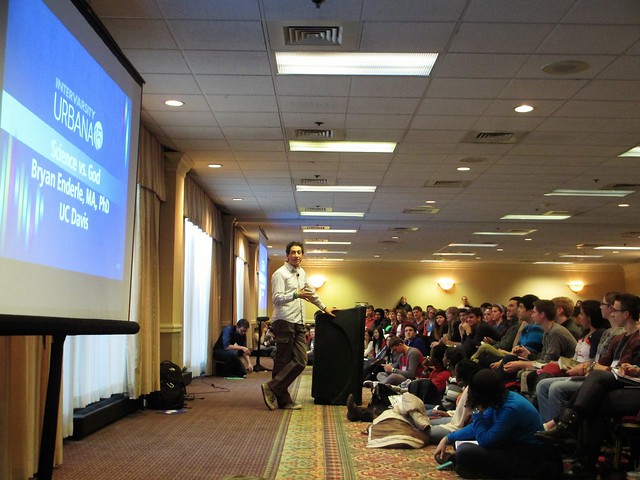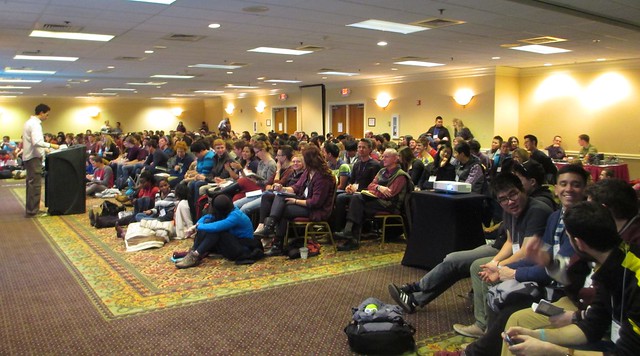How does modern science and scientific theory intersect with the Bible and the Christian story? At Urbana, Bryan Enderle explored philosophical arguments and quantum mechanics to bring these two seemingly separate threads together.
From Dec 27 – Jan 1, volunteers with our network of early career Christian academics are liveblogging seminars at the Urbana conference, a mission-focused student gathering of 16,000 Christians from across North America and the world. This post was written by Rebecca Carlson and Angelo Blancaflor
 Bryan Enderle is a faculty member at the University of California – Davis as a part of the Department of Chemistry. In addition, he serves as an assistant area director with InterVarsity. He’s given several TEDX talks about how science and faith can intersect. You can find him on Youtube, and through email: enderle at ucdavis dot edu.
Bryan Enderle is a faculty member at the University of California – Davis as a part of the Department of Chemistry. In addition, he serves as an assistant area director with InterVarsity. He’s given several TEDX talks about how science and faith can intersect. You can find him on Youtube, and through email: enderle at ucdavis dot edu.
“You cannot mix areas that ought not be mixed. But there are places that can be mixed. Our society has the idea that God has nothing to do with it,” Bryan says. His early experience regarding intersecting God and science was awkward, and tense. At a TED talk he gave, a volunteer asked him how he could believe in God, who cannot be proven with science. “I asked, ‘Do you have a girlfriend? Can you prove to me using science that your girlfriend loves you?’” At the end of his talk, Bryan says, the people that challenged him had a complete turnaround.
The Importance of Realities That We Cannot See
“Many of the early scientists were Christians.” Bryan quotes Isaac Newton to emphasize the ways science and faith have already interacted: ‘The most beautiful system of the sun, planets, and comets, could only proceed from the counsel and dominion of an intelligent and powerful Being.’ Brian starts out by questioning realities that we don’t think about ordinarily. The Borh Model of the atom (“simple science here,” he jokes) describes atoms as 99.9999999999999% empty. “You hardly are here!” he expresses. Sometimes, the reality of the world isn’t something we see. Bryan continues with a riddle: if we were all born together in the same room without contact with the outside, how could we know something exists outside? We look at the objects in the room, like pens, and podiums, and wonder how they got there without the people inside building them. “There’s people on both sides [of the argument]. ‘We have no way to test it;’ or, ‘obviously there has to be something outside!’” This is the question we ask about our universe: is there anything else besides us? We have to make inferences and ask questions. For example, we can’t see an atom with our eyes, but we have evidence to prove its existence. We build a model from this evidence. Theories come from data, and could change over time, but the evidence and experimentation are all only steps.
Distinguishing Processes from Sources
Systems are devices with three parts. A source, or the idea behind the device. A process (of creating and designing the device). Finally the system itself, or what we observe and see. Bryan returns to his riddle: If we find a pen in the room, did someone make it, or was it just there? The reality is that someone imagined it, then put together the materials, and then created the pen itself. But as a user, we don’t need to understand the process of creating the pen, only its use. In other words, we don’t care about the source or the process, just the system. “You are just a user,” Bryan says. Unfortunately, many people say “I can function well in my universe without thinking about the source or scientific processes [behind them]. Sadly on the science side and the theology side, that’s what happens.” Bryan uses this model to distinguish science and faith: “Science in general fits within the process category. It does not study the source, and it’s not designed to do so. That’s for philosophers, theologians. I could not say, hey I don’t believe in God because of science, or I don’t believe in science because of God. Those are nonsequential statements. They can work in parallel but not to discount each other.”
Metaphysical and Empirical Questions
Bryan asks: In the Big Bang model, what was at t=0? Or before? What was there without time, space, or matter? We can’t say what’s before either, because there was no time. Some people have spiritual answers, or offer a multiverse model. Some simply answer with no, or I don’t know. Bryan defines all of these answers as metaphysical – not empirically provable. The atheist and theist are not that far apart! Looking at Genesis 1, “We think God, magic, poof, cow, naturally in our society. We impose an imagination about Genesis that’s not there. God decided not to give the details, just the results. It’s not God’s purpose for the Bible to describe it scientifically. Not everything is in the Bible.” Bryan gives an example of making a sandwich. When he tells us that he made a sandwich, we don’t think “Enderle, magic, poof, sandwich. That’s ridiculous!”
Analogies Between God and Contemporary Understandings of Light
Bryan uses the theory of relativity as an example. In Einstein’s relativity, the faster you go, the slower time goes from the point of the observer. The Hafele-Keating experiment proved this by using synchronized atomic clocks traveling at different speeds, with one on the ground and another on a plane. When they compared the clocks, they were no longer synchronized – the clock on the plane was behind on time. He makes the parallel that God describes himself as light in John 8:12. Before the 1900s, we assumed that it was magic. However, science, through relativity, has set a modern precedent that entities can be “outside of time.” It shouldn’t be a surprise that this is true for God if it is true for light. “It’s not magic, but we ask often, how can God be omniscient and outside of time? But there is a precedent of modern science for an entity like light to be outside of time.” While it’s an analogy and not proof, it shows that there are parallels between science research and theology. God isn’t just magic, says Bryan.
Consistencies Between Understandings of God and Science
“I think that God and science can be completely consistent. You have to engage with faith all the time.” When we sit on chairs, we have faith that we can sit without testing its structural integrity, based on inferences of what we’ve seen. Bryan couldn’t prove scientifically that he and his wife would be a good match. “At the altar I realized, ‘I can gather all the things I want, but there is no way I can prove that this is gonna work. I had to have a bit of faith to say, ‘I do’” Bryan also tells the audience about own coming to faith. He visited church and read the bible primarily because “I was concerned about someone asking me why I don’t believe. I should go to church to find out why I don’t go to church.” Finally, Bryan shows a picture of a sunset. How does it make you feel? Some see emotions: happiness and calm. Others see the scientific details: light from the sun penetrating the atmosphere and exciting electrons. Which is right? “Both scientific explanations and our theology give us a holistic view of what our universe is like. You need both!”
Recommended Resources
- Gerald Schroeder – The Science of God, The Hidden Face of God
- John Polkinghorne – Quarks, Chaos, and Christianity
- Biologos, an organization that sets out to harmonize science and faith
- Ralph Cox – God Is, God Spoke, God Came
- James Sire – The Universe Next Door
- Chan Kei Thong – Finding God in Ancient China
- Lee Strobel – The Case for Creator, The Case for Faith, The Case for Christ
- Leslie Wickman – God of the Big Bang
Questions and Answers
How do you balance your scientific study with your theological study?
For me, removing the presupposition that they cannot intermingle has opened up more connections. I made sure that God is not taking a second seat to research.
Would you say that God made living things and that they evolved, or that God made everything. What’s your view?
Before I give you my view, regardless, what I’ve said still holds. My seminar was purposefully outside of this question. Two arguments are the strongest for Genesis and evolution.
First, from Schroeder’s Science of God. In Genesis, the third day having dry ground implies that the first two days had no Earth. On the science side, a 4 billion year old Earth and a 14 billion year old universe means that in both, there was a period of time without an Earth. It’s possible that Genesis offers a non-Earth based time.
Second, in Sailhamer’s Genesis Unbound. This book is more theological. What is the Earth in Genesis 1? Maybe it’s not a planet, but only the promised land?
Should we consider Adam/Noah metaphorical or literal? How is it literally possible? Give your view.
Well, what makes Adam unique? He’s unique in that God breathed in him the Spirit. Perhaps he’s not necessarily the first hominid. Maybe the spirit passes on through reproduction,
In Noah, the word “all” in “all the world” requires interpretation. Was the flood local (the world as the people knew it), or the entire world (beyond what was known)? Regardless, this thing and the evolution thing is not something I’d die for.
Rebecca is a junior at Michigan State University studying Chemical Engineering and Chinese. She is a leader in Bridges International and is a research assistant in a biomolecular engineering lab on campus. She grew up in Italy and loves learning about other cultures and languages, as well as chatting about immunology, bioinformatics, and the intersection of science and faith.


Leave a Reply